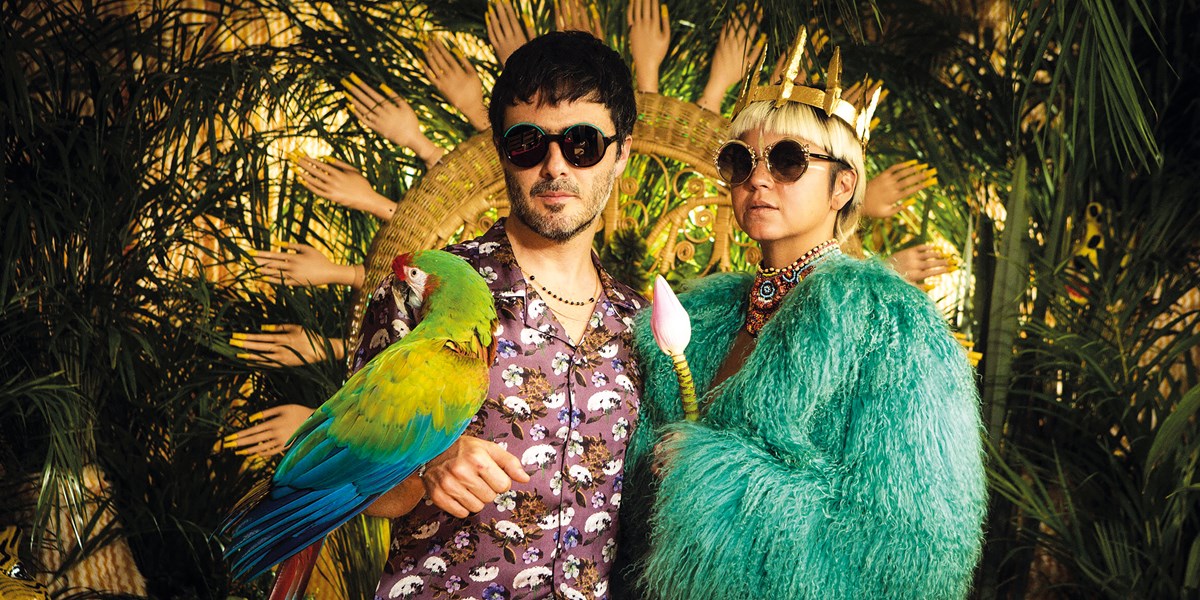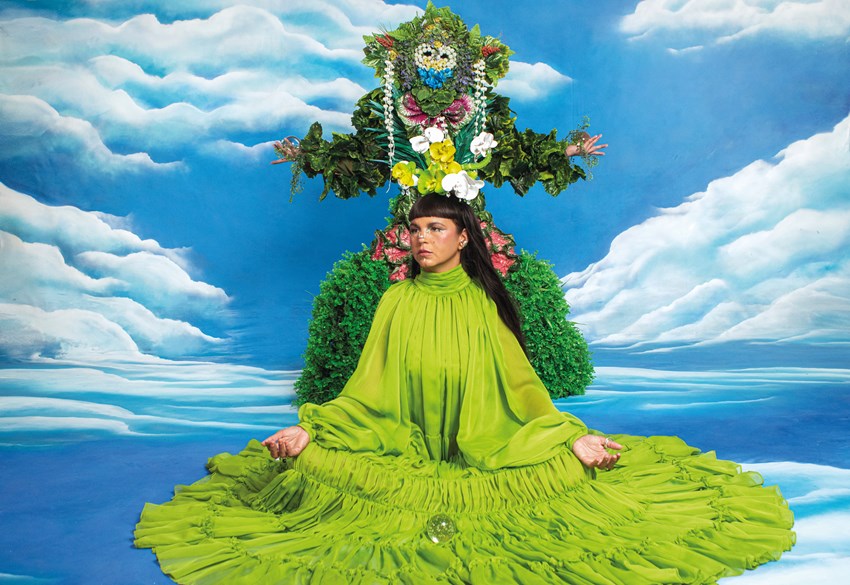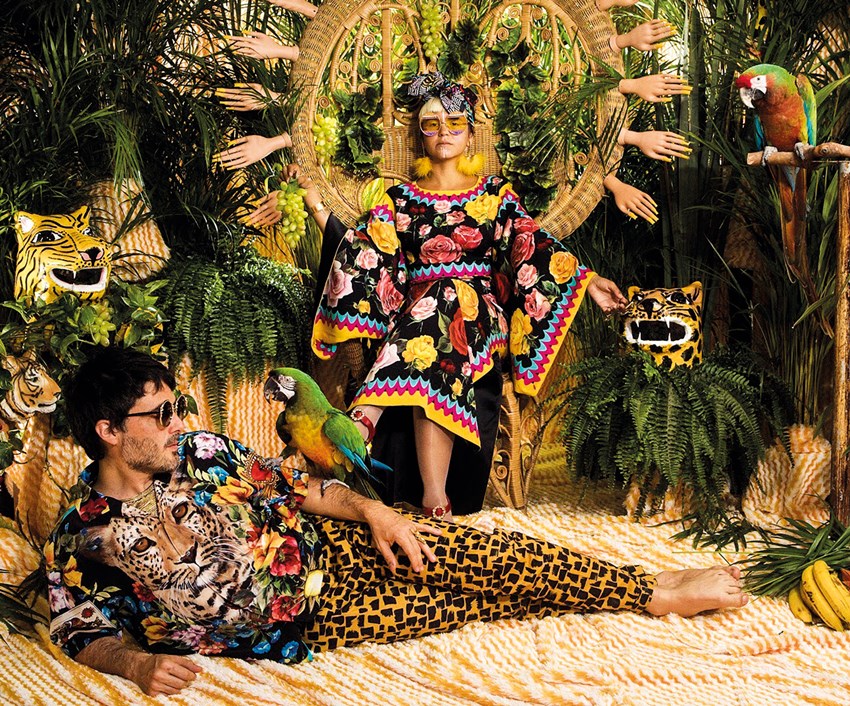Wednesday, September 1, 2021
“You don’t need to sing well, you need to sing from your soul. So, I sing from my soul” | Bomba Estéreo on finding their authentic musical voice
Colombia’s Bomba Estéreo speak to Russ Slater about their aim to propagate positivity amid political upheaval via their distinctive tropical sound

Bomba Estéreo (photo: Orly Anan)
When I speak to Simón Mejía and Liliana Saumet, the two guiding forces of Bomba Estéreo, there is no avoiding the direction of the conversation. Protests in Colombia that began in late April are ongoing, exacerbated by a repressive response from the authorities which has left many dead and injured. These protests, which began as a response to a government tax reform, have also amplified in scope to include a growing litany of issues, broadly corruption, inequality and neglect. The situation is on the forefront of both of their minds. “In social terms, it’s interesting because it’s the first time, almost, in the history of Colombia, that young people are really seriously out in the streets,” says Mejía. “They don’t care about the police, you know, and this is really brave,” adds Saumet. “I’m so grateful for this generation on the frontline. This time, I hope it’s going to be different. I don’t know, but I feel that,” she declares optimistically. “This is the beginning of something, but we have so many conflicts here. In the short term, I don’t see the light,” worries Mejía, the duo already making clear the yin and yang outlooks that are at the heart of the group. “Simón is Cancer,” jokes Saumet. “And I’m a Capricorn. So, all the time he’s like, ‘go back’. And I’m like, ‘OK, let’s go for the risky mountain’.”

Li Saumet: “You don’t need to sing ell, you need to sing from the soul”
Perhaps it’s this difference in approach that has helped them become such an effective partnership as Bomba Estéreo, releasing a string of critically-acclaimed albums that have garnered Grammy nominations and given them a unique status as a hugely successful Colombian band signed to a major international label (Sony), but who still live in the country and have never strayed far from the independent music scene that gave birth to them. This year, they release Deja, a record fuelled by protests that have erupted not just in Colombia, but across Latin America over recent years, and a need to offer positivity throughout the chaos.
They formed in Bogotá in the mid-2000s. Mejía, a Bogotá native, was fresh from playing in rock bands but had switched to electronic music in the late 90s. “In the beginning I was doing pure electronic: house music, techno, but then I thought, ‘What’s the sense of making house and techno here in Colombia?’ In Berlin or in New York, London, they make it even better. So I have to find a sound that’s new and has to do with our tropical dance music.” He was not alone, a small scene of like-minded souls were doing something similar: Pernett, Systema Solar, Sidestepper. Then he saw Saumet singing in her first group, Mister Gomes en Bombay: “I was like, ‘Wow.’ She had that colour in her voice, like you have in folk singers in Colombia, a lot of throat and nose, so strong and not so perfectly tuned. It’s beautiful. But at the same time, she had this rapping thing, and really interesting, simple and powerful lyrics. I invited her to the studio, we did one song and it was a perfect match. From then on, we kept on working together.”
If Saumet had something of a folk singer’s voice, this was not by accident. She grew up in Santa Marta on Colombia’s Caribbean coast, with family further up the coast in Barranquilla, home of Colombia’s beloved carnival. “Every year when I was a kid I participated in carnival,” she says. “It’s one of the most significant things that made me feel that music: cumbia and folklore, African, indigenous culture, tambores [drums].” In regards to how she developed her specific singing style, she explains: “I never tried to sing like another person. I knew that I can sing like cantadoras [female Colombian folk singers] because this is my DNA. This is what I know. I can’t try to sing ‘la la la’ [sings a scale]. This is what happens when you go to the university or to study music, they tell you that you need to sing well. You don’t need to sing well, you need to sing from your soul. So, I sing from my soul.”
Mejía’s electronic music project was eventually rechristened Bomba Estéreo, and their debut album featured Saumet, who had moved to Bogotá after finishing university, on one song when first released. However, by their second album, Estalla (2008), the group had evolved into a live band, with Saumet established as the main vocalist, in addition to guitars, percussion, drums and Mejía on bass and keyboards. Their sound was also firmly established, with rhythms, drums and gaita (flute) showing their love of Colombian folk music, but with Saumet’s fierce rap-like delivery, psychedelic Afro-Colombian-influenced guitars and Mejía’s careful production taking the music to somewhere distinct. This album would later be retitled Blow Up and released by Nacional Records in the US. Saumet recalls how this opportunity arose: “We went to the studio and made a song in 45 minutes. Simón gave me the beat and I wrote a song. We recorded it and he goes to New York the next day. When he came back, he said: ‘Hey, Nacional’ – which was the most important Latin American alternative label in that moment – ‘they chose the song for a compilation’.” Mejía remembers, “we became more popular outside of Colombia. In those days, this kind of music was not so well accepted here, there were people saying: ‘These guys are destroying traditional music, destroying Colombian folk music’.”
Estalla included their break-out single, ‘Fuego’, an incendiary statement of intent that acted as a declaration of their sound: ‘Here comes Bomba Estéreo / We come with everything, champeta / reggae music, cumbia… a bit of folk music with electronic music,’ and a chorus in which Saumet showed how much passion she could put into just one word: fuego (fire). Since then the group have released a series of well-received albums, and a number of singles that have struck a chord internationally: ‘Soy Yo’, with an unusual flute and beatbox chorus, was an anthem of empowerment, about being free to be oneself; both ‘Somos Dos’ and ‘To My Love’ (the latter being their biggest hit thanks to a Tainy remix) were catchy romantic numbers whose videos paid tribute to Colombia’s Caribbean coast; and they even got contacted by the American actor Will Smith who loved their song ‘Fiesta’ so much he wanted to add his own verse. It’s put the group in an enviable position of being able to make their own schedule, and even act independently, releasing their Live in Dublin album in 2018 on Colombia’s Polen Records, the local label they started out with.

Their new album, Deja, was written and recorded in 2019, with Mejía and band member José Castillo working in Bogotá, and then sending backing tracks to Saumet, who had gone to Toronto, Canada to collaborate on the album with fellow Colombian Lido Pimienta (whose 2020 album Miss Colombia offers a similarly contemporary take on folk music). The two duos sent tracks back and forth until they eventually all convened in Santa Marta and finished the album, thinking it would be released in 2020. When the pandemic hit that date was put back, ultimately giving them extra time to mix the record and work out how to get it out into the world. “I got sick and tired of all these artists releasing a song every week,” says Saumet. “This is not art, this is business, and I don’t want to make a business album, I want to follow the time of nature.” Thus, the group have been releasing Deja gradually as EPs, releasing three songs as ‘Agua’ (Water), before another three as ‘Aire’ (Air), with more as ‘Tierra’ (Earth) and ‘Fuego’ (Fire) to come. “We chose the elements because all the problems the world has right now are connected with the earth or with ourselves,” states Saumet.
These problems are made clear on ‘Agua’, whose lyrics focus on the poisoning of the water and land we rely on, while on ‘Tierra’ these concerns have erupted into Bomba Estéreo’s clearest protest song yet, its message growing in significance due to the latest unrest. While it documents the sale of land and destruction of valuable habitats (‘They took the wind / They burnt the jungle / They sold the land / They turned off the sun’) it is also, characteristically for Bomba, imbued with hope: ‘[we can] write our own history / we can be unique / we can be better,’ Saumet sings, with the final pay-off of ‘let’s dance’ ensuring this protest song is as much about taking positive action as documenting destruction. “We did one show in the protests of 2018 and we played that song, and people were crying. It speaks about Colombia, about the conflict and everything,” says Mejía.
It also chimes with one of Saumet’s aims for the album: “I was sick and tired of how people are talking about stupid things, you know sexist [things], and women, money, how they want to touch you, it is stupid. And I was thinking that we are in a position where people listen to us [so] we need to make lyrics that are deeper. I was super focused on this album, to make sure all the songs have a message which is positive and can change the minds of people, because music is really mantric. With one song [we can] change one life.”
Musically, the album continues the group’s signature style, with backing tracks based on Colombia’s folk rhythms – on ‘Tierra’ there are clear echoes of Colombia’s Pacific Coast in the charged hand drumming; ‘Agua’ is a reimagined bullerengue; and ‘Tamborero’ takes inspiration from a branch of cumbia known as son de negro – but played with bass, synths and electronic beats until they take on a new form. The later augmentation of local instruments (flute, marimba, native drums) and guitar, as well as Saumet’s vocals, then add further colombianidad into the production. Often, their style is classified as ‘electro-cumbia’ or ‘cumbia for the 21st century,’ according to one recent article, but trying to pick out a cumbia rhythm on Deja isn’t easy. “Bomba’s history is tied to cumbia as it was the original inspiration for me in trying to find an original sound for electronic music made in Colombia,” Mejía explains. “But I wouldn’t say we are a cumbia band now as we don’t play folk music or accordion music, and we’re not even an electronic cumbia band because we evolved into something else over the years. [We have] the cumbia colours and heart, the [instruments], but in our own style.”
The key to a group’s longevity is often borne out of their internal dynamics, and in the case of Bomba Estéreo it seems like the partnership of Mejía, the glass-half-full bogotano willing to work a serious shift in the studio, and Saumet, the eternal optimist from the Caribbean coast, whose direct, passionate lyrics are able to touch the souls of many, have found the perfect blend. While they may not agree on how the protests will pan out, music will always be their common ground. And in a musical universe where everyone is mixing styles to the extent that genres are becoming unworkable if not redundant, they even have their own language: Bomba, tropical music for a bright future (well, at least if you ask Saumet).
Read the review of Deja in the Songlines Reviews Database: Deja review
This interview originally appeared in the August/September issue of Songlines. Never miss an issue – subscribe today

